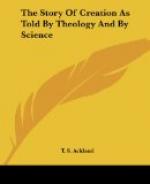We come now to the theory of Sexual Selection, which is to account for those peculiarities and distinctions which can have no beneficial effect in the struggle of life, and which are accounted for on the supposition that they render their possessors more agreeable to the opposite sex, and so facilitate pairing, so that those animals which possess them in a remarkable degree would have the greatest chance of continuing their race. The case on which Mr. Darwin mainly rests his argument is that of birds, in which the males are frequently distinguished by exquisite colours and very graceful markings, and in which also the proceedings of the sexes can, in many cases, be more easily watched.
It is in maintaining this theory that Mr. Darwin has such frequent recourse to what may be called the “argumentum ad ignorantiam.” “If such and such organs or ornaments were not designed for this or that particular object, then we do not know of what use they are.” [Footnote: For instance, Descent of Man, vol. ii. pp. 284. 399.] This maybe very true, but it proves nothing, unless we assume that we are or ought to be acquainted with, the use and object of everything in nature. And it involves another and a very wide question. There are certain tastes which seem to be inherent in our nature, and there are certain external objects which afford gratification to those tastes. Must we view this coincidence as merely accidental? or is it a part of the design of the world that it should minister not only to our needs, but also to our enjoyments? Mr. Darwin does not reject the idea of an Author and Designer of Nature, is he then prepared to assert that beauty did not form a part of the design as well as utility? [Footnote: In the “Origin of Species,” p 159, Mr. Darwin does seem to assert this; but he says in conclusion, “How the sense of beauty in its simplest form—that is, the reception of a peculiar kind of pleasure from certain colours, forms, and sounds—was first developed in the mind of man and of the lower animals is a very obscure subject,” p. 162. To Mr. Darwin, with his present views, it may well be obscure; but it presents no obscurity at all to those who believe that the universe in all its details was designed, and its formation superintended, by a loving Father, whose will was that it should not only supply the needs, but also minister to the enjoyment of all His creatures, nor to those who in every form of beauty, physical, intellectual, or moral, behold a far-off reflexion of the glory of the Invisible Creator.] If he is not prepared to assert this, he must admit the possibility that many things exist whose sole object is to minister to that sense of beauty which is probably possessed by other beings besides ourselves.




